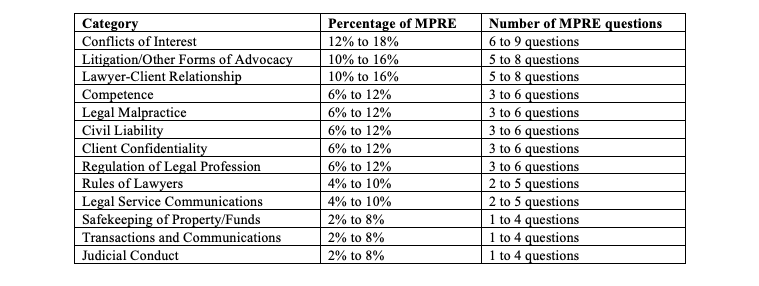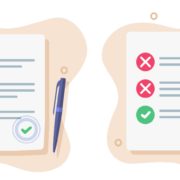What If I Fail The MPRE?
What If I Fail The MPRE?
Failing the Multistate Professional Responsibility Exam (MPRE) is a situation that many, many law students have faced. Some students pass the bar exam with flying colors only to find themselves struggling to pass the MPRE. However, there is no need to panic about failing the MPRE – you can take the MPRE again! In this discussion, our aim is to discuss how to pivot if you fail the MPRE.
What If I Fail The MPRE?
A Brief Discussion of the MPRE
Before we start discussing what to do if you fail the MPRE, it might be helpful to have some context regarding the MPRE. The National Conference for Bar Examiners offers the MPRE three times per year. The MPRE measures an examinee’s knowledge of the ABA Model Rules of Professional Conduct. It is not a test meant to reflect an examinee’s personal or ethical values. The MPRE consists of 60 multiple-choice questions over the course of two hours. Almost all United States jurisdictions, with the exception of Wisconsin and Puerto Rico, require lawyers to pass the MPRE. Each jurisdiction, however, has its own definition as to what constitutes a passing score. For example, Illinois requires an MPRE score of 80, while the District of Columbia requires a passing score of 75. Be sure to check with the jurisdiction where you intend to practice to ensure you are striving to obtain the correct score.
Signs that you potentially passed the MPRE
First things first – before we focus on what you could expect if you failed the MPRE, let’s first assess whether you actually know you failed or whether you are doom-searching while you await your results. If you fall into the latter category, we can provide you with some good indicators that you may have actually passed the MPRE! If the following factors describe your experience, you likely passed the MPRE.
You finished the full exam
The MPRE has 60 questions, 50 of which are actually graded. Examinees have two hours to complete the exam. If you finished the MPRE in the given time without feeling very rushed or like you were running out of time, that indicates that you had a good pace on the exam. Maintaining a suitable pace indicates that you likely knew the material, which is a sign that you passed.
You were not surprised by any questions
If none of the MPRE questions seemed like something you did not know about at all, that is a good sign that you likely passed the MPRE. Not being surprised is a good sign that you knew the material well, making it more likely that you passed!
You studied for the MPRE and took practice exams
If you took the need to pass the MPRE seriously and you spent the time studying for the MPRE earnestly, it is likely that you passed the MPRE. Many law students do not take their first attempts at the MPRE very seriously, despite the fact that it is an exam that law students are required to pass in almost all United States jurisdictions. You may have heard that you need nominal studying and common sense to pass the MPRE – but that is not true. Relying exclusively on your law school legal professionalism class is not a strong foundation for passing the MPRE. If you studied and attempted practice tests, you have a better chance at passing the MPRE.
Your score improved on practice MPREs
If, during your study process, you took practice MPREs and you saw score improvement, this is a sign that you are on your way to passing the MPRE. Practice test score improvement is a clear sign that you were learning as you studied. Also, if your practice test scores fit into the passing range in your jurisdiction, then you likely passed the MPRE.
You felt calm during the exam
If you did not feel panicked when a particular question showed up on the MPRE, or if you had a sense of calm, this is another sign that you passed. Not feeling too panicky indicates that you felt comfortable with not only the material but how the material appeared on the exam.
Will people know that you failed?
No. Unlike the bar exam results in some states that are publicly published after each administration, MPRE results or passage lists are private. Your results are posted to your individual account on the NCBE’s website but are not otherwise publicly available. People will only know that you failed if you choose to tell them.
Can you take the MPRE again?
Yes, you can take the MPRE again. There is no limit on the number of times that you can sit for the MPRE. However, keep in mind that the NCBE only offers the MPRE three times per year. You’ll have to wait several months before you can attempt to retake the exam. Also, be sure to look at the rules in the jurisdiction where you’re hoping to practice. Some jurisdictions require that you pass the MPRE before you can retake the bar exam. Additionally, failing the MPRE can delay the process of obtaining your law license.
What should you do if you fail the MPRE?
If you fail the MPRE, there are immediate steps you can take to plan ahead for the next MPRE administration.
Establish a study schedule
This is a basic point but taking the time to create and plan out a study schedule that you can stick to is crucial for your success. Calmly planning out your dedicated time to focus on the MPRE will make following that schedule and consistency that much easier. If you are balancing the MPRE with law school studies, make sure you’re allotting enough time to study. This might involve studying for smaller chunks over a longer period as opposed to cramming the week before the exam.
Be mentally prepared
Oftentimes, the feeling of disappointment or anger with yourself after you fail something can be overwhelming. But it is important for you to remember that the MPRE is difficult and you are not the only law student who has failed the MPRE! As you continue to study and move closer to your next MPRE administration, try not to focus too much on the past. It’s more productive and useful to recognize that things happen, but you still have other opportunities to study diligently for and take the MPRE. Also, make sure to physically prepare leading up to the next MPRE administration – this means you should sleep well, eat well, and get some exercise.
Focus on remembering and understanding the model rules
With respect to pivoting your studying approach, it is important to first and foremost focus on both remembering the rules and understanding what they are intended to do. Knowing the rules is key to navigating new question types on the MPRE. By spending some time memorizing rules (and not just doing practice questions), you will have the rule framework established in your mind which means fewer surprises on the MPRE.
Complete more practice exams – with the right questions
Not to sound like a broken record, but practice, practice, practice – with real MPRE questions! A common reason that law students fail the MPRE is that they practiced with questions that were not real MPRE questions – meaning that the student did not get a real sense of what MPRE questions are actually like. You can find real MPRE questions through these sources, so you will not be without a source for exam material.
We recommend that if there is a particular model rule that you do not understand, you review the comments to the model answer. The American Bar Association offers a free version of the model rules and the parallel comments to the rules. These comments are beneficial to read because many MPRE questions and fact patterns come from these comments.
Once you feel that you know the model rules well, make sure that you take practice tests so you can get your timing down. By taking a practice exam or two in exam-like conditions, you’ll know if you’re spending too much time per question or if you are rushing through and not carefully reviewing the answer choices.
What is the best time to take the MPRE?
There is no real “best” time to take the MPRE again. The exam is equally difficult at each administration. Second, the answer to this question depends on your year in law school, your other obligations and time commitments, and your goals. For example, if you’re a 3L and you failed the November MPRE, the next MPRE administration will be the following March. If your goal is to take the MPRE before the July bar exam, March is your last chance. JD Advising discusses additional information on this topic and why you can take the MPRE at any time.
Are there buzzwords on the MPRE to which you should pay attention?
There are key buzzwords! The NCBE posted a helpful document discussing some of these words. The two key phrases that are most relevant to MPRE re-takers are “subject to discipline” and “subject to litigation sanction.” JD Advising discusses additional keywords and phrases on the MPRE in this post and in this post.
Subject to discipline
This is one of the most common phrases that you will see on the MPRE. In these questions, you must answer whether the lawyer’s conduct violates the ABA Model Rules of Professional Conduct. An MPRE question with this basis is one where your knowledge of the rules and the intent of the rules really comes into play. While in some situations, these types of questions will be straightforward enough that students can intuit the answer, that approach will not be applicable to most “subject to discipline” questions because there are so many distinctions in the model rules.
Subject to litigation sanction
Unlike “subject to discipline,” this phrase applies to both lawyers and law firms. This phrase is asking whether the lawyer’s or the law firm’s conduct or behavior would face discipline for the court or tribunal at issue. Keep in mind, too, that there are many forms of litigation sanctions: fines, disqualification, fee forfeiture, or consequences for contempt.
What categories of questions does the MPRE test?
There are thirteen different subject areas that can appear on the MPRE. We included a chart below that includes each topic ordered from the largest to the smallest number of MPRE questions.
What is the best approach for studying for and tackling the MPRE?
We recommend that you take the MPRE seriously. We have commented on why students underestimate the MPRE. It truly requires familiarity with all of the ABA Rules to achieve success. In order to take it seriously, we recommend that you prepare a study plan for yourself for a few weeks before the administration of the MPRE. We offer a 21-day study schedule to prepare for the MPRE that is based off our free MPRE course, free MPRE guide, and free MPRE one-sheet.
In terms of how to best tackle MPRE questions, both practice questions and on exam day, we have discussed a six-step MPRE taking strategy. This strategy discusses how to methodically approach the question from your first read-through to eliminating wrong answers, and to reach the correct conclusion. Beyond these resources, we also offer plenty of free MPRE resources!
Just remember, if you fail the MPRE, you can take the test again. With a diligent plan, you can pass the next MPRE!
Looking to Ace the MPRE?
- Enroll in our 5-star rated free MPRE Course, complete with expert guidance, an exclusive outline, practice questions, and a one-sheet.
- Tackle the Real MPRE questions — the gold standard for test preparation.
- Elevate your preparation with personalized MPRE private tutoring, featuring a tailored study plan and dedicated MPRE outline.
- Dive into our assortment of complimentary top-notch MPRE resources for your success.












Leave a Reply
Want to join the discussion?Feel free to contribute!